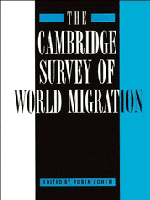Book contents
- Frontmatter
- Contents
- List of illustrations
- List of tables
- Notes on the contributors
- 1 Prologue
- 2 European colonization and settlement
- 3 Asian indentured and colonial migration
- 4 The great Atlantic migration to North America
- 5 Migration in Europe, 1800–1950
- 6 Migration in Africa
- 7 Latin and Central American migration
- 8 Migration to North America after 1945
- 9 Labour migration to western Europe after 1945
- 10 Repatriates and colonial auxiliaries
- 11 Migration in Asia and Oceania
- 12 Migration in the Middle East
- 13 Refugees from political conflict
- 14 Migrants and asylum-seekers in contemporary Europe
- 15 Emerging trends
- Acknowledgements and credits
- Index
2 - European colonization and settlement
Published online by Cambridge University Press: 05 December 2012
- Frontmatter
- Contents
- List of illustrations
- List of tables
- Notes on the contributors
- 1 Prologue
- 2 European colonization and settlement
- 3 Asian indentured and colonial migration
- 4 The great Atlantic migration to North America
- 5 Migration in Europe, 1800–1950
- 6 Migration in Africa
- 7 Latin and Central American migration
- 8 Migration to North America after 1945
- 9 Labour migration to western Europe after 1945
- 10 Repatriates and colonial auxiliaries
- 11 Migration in Asia and Oceania
- 12 Migration in the Middle East
- 13 Refugees from political conflict
- 14 Migrants and asylum-seekers in contemporary Europe
- 15 Emerging trends
- Acknowledgements and credits
- Index
Summary
The major European colonial powers were Britain, the Netherlands, Portugal, France and Spain, but Britain was to prove the most successful by far in using the export of population to establish its imperial hegemony. As Tinker notes, this was far from accidental, as popular myth held. Emigration to the settler countries was systematically planned as a solution to social problems at home and a means of expanding English (then British) interests abroad. This notion was first advanced in a state paper delivered to James I by Bacon in 1606. He suggested that by emigration England would gain, ‘a double commodity, in the avoidance of people here, and in making use of them there’ (cited Williams 1964: 10). The poor rates and overpopulation would be relieved and idlers, vagrants and criminals would be put to good use elsewhere.
Once established, the principle was extended laterally. Scottish crofters, troublesome Irish peasants, dissident soldiers (like the Levellers), convicts, victims of the Great Fire of London – all were shipped out to the colonies of settlement. Indigent and orphaned children also met the same fate. Under various child migration schemes, the first batch was sent to Richmond, Virginia, in 1617, while the last group left for Canada as late as 1967. The scale of these schemes can be indicated by noting that 11 per cent of Canada's population is derived from destitute British children (Bean and Melville 1989). The numbers from all sources (free and induced) were greater than in the case of any other European power, but just as significant was the intent of the emigration.
- Type
- Chapter
- Information
- The Cambridge Survey of World Migration , pp. 11 - 44Publisher: Cambridge University PressPrint publication year: 1995
- 1
- Cited by

